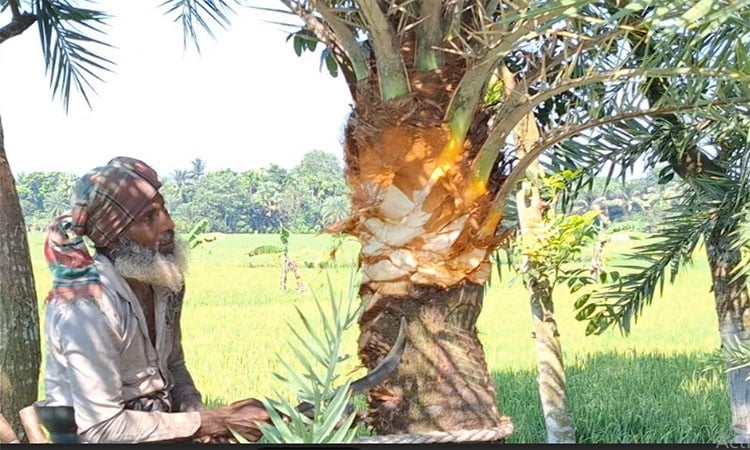News Flash
News Flash

LALMONIRHAT, Oct 27, 2025 (BSS) - Although winter has not yet fully set in, date palm sap collectors across the district have already started preparations to collect date palm juice - a seasonal tradition that signals the arrival of winter in rural Bangladesh.
In various areas of the district, gachhis are busy cleaning and preparing date palm trees, installing bamboo pipes, and setting up temporary workstations near groves.
Within a few weeks, when the temperature drops further, the much-anticipated season of collecting sweet sap and making jiggery (Gur) will begin.
According to local sources, the process of cleaning the trees and fitting pipes is currently underway. Farmers are also storing alternative fuels in advance to use for boiling the sap into jaggery during peak production months. The date juice and jaggery season typically lasts for about five months.
Officials from the District Agriculture Department said date palm trees are scattered across roughly five hectares of land in Lalmonirhat. The trees are often found individually in homesteads, along roadsides, or beside crop fields-still carrying the essence of rural heritage.
Local farmers Biplob Chandra Roy, Rezaul Karim, and Aminul Hossain of Baliram village in Barabari union said they each have two to three date palm trees in their courtyards. However, many trees remain unused due to a lack of trained workers.
They urged the government to take initiatives to train young people in sap extraction and jaggery production, saying this could revive the traditional craft and enhance rural income.
Experienced date palm grower Tarejamal Uddin of Teestapar said he travels to Lalmonirhat, Rajarhat in Kurigram, and nearby areas during the season to buy trees from owners.
"I buy trees for the season, collect sap, and sell it with my team," he explained. "First, we cut the golden top of the tree with a sharp hoe. After 8-10 days, we insert a tube, and within a week, the sweet sap starts to flow. Right now, we are busy preparing for that."
Tarejamal also said that the number of traditional sap collectors, locally known as gachhi, is decreasing each year due to a decline in tree numbers and a lack of interest among the younger generation.
Another gachhi Jahangir Hossain, shared similar concerns "The younger generation doesn't want to learn this skill. They are more focused on city life, education, and jobs. If the government provided training and incentives, many new gachhi could be created, strengthening the rural economy."
Ramzan Ali, another gachhi, said he and his team plan to cut over 200 trees this season. "Since there are few gachhi left, people are bringing workers from other districts. If the number of local sap collectors increased, we could produce and sell more jaggery," he said.
Dr. Md. Saikhul Arifin, Deputy Director of Department of Agricultural Extension (DAE) emphasized the ecological and cultural importance of date palm trees.
"The role of date palm trees is vital in maintaining environmental balance," he said. "Date palm juice and jaggery are inseparable parts of our rural tradition."
He added that while the number of trees in Lalmonirhat is currently low, proper care and new planting efforts could significantly boost sap extraction and jaggery production in the coming years. "In the future, we plan to focus on both date palm and palm tree cultivation," he said.
As preparations continue and the chill of winter begins to set in, rural Lalmonirhat once again readies itself for the sweet, nostalgic aroma of freshly boiled date palm jaggery - a hallmark of Bangladesh's countryside winter.